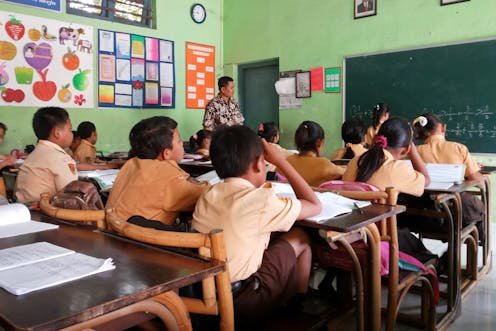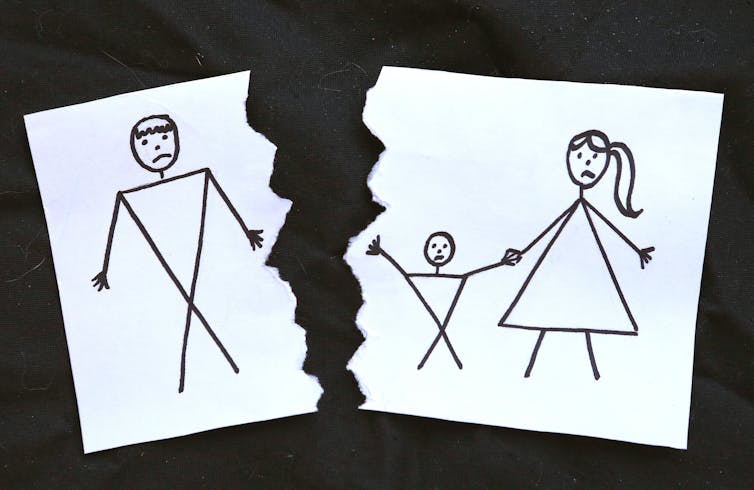Old habits die hard: why teachers in Indonesia still struggle to teach critical thinking
- Written by Maya Defianty, Dosen di Fakultas Ilmu Pendidikan dan Tarbiyah (FITK), UIN Syarif Hidayatullah, Jakarta, Universitas Islam Negeri Syarif Hidayatullah Jakarta

In an increasingly digitalised and automated world, education organisations worldwide have recognised critical thinking as a vital and valued skill[1] in the 21st century. It equips students with the ability to criticise and sift through the large amounts of information now at their fingertips, and analyse unique problems to create novel solutions.
In many countries, including Indonesia, critical thinking is enshrined in policy. Indonesia’s newest curriculum, for instance, dubbed “Kurikulum Merdeka[2]” (Freedom Curriculum) for its emphasis on personalised learning, explicitly states critical thinking as an essential quality for graduates.
Read more: Thinking about thinking helps kids learn. How can we teach critical thinking?[3]
One of Indonesia’s first policies[4] that specifically mandated Indonesian teachers to embed critical thinking in their classroom was enacted in 2010 – more than a decade ago.
Yet despite the existence of such policies, our recent study[5] finds that many Indonesian teachers still struggle to teach and cultivate the skill.
Though awareness of critical thinking is high, when teaching the skill, teachers still fall back on old habits ingrained in Indonesian education[6]. This includes a culture of rote learning (lessons based on memorizing information) and “teaching to test”.
In the latest Programme for International Student Assessment (PISA) tests[7] in 2018, Indonesian students ranked within the bottom ten out of nearly 80 participating countries[8]. They attained very low marks in a number of critical thinking-related indicators – namely literacy and numeracy.
Old habits die hard
One reason for this problem lies in the questions Indonesian teachers pose in their classrooms.
In our study of English classrooms[9] in a number of Indonesian high schools, we found that instead of encouraging students to think and reflect[10], teachers strictly follow an “initiate-respond-evaluate” pattern of instruction. In other words, teachers stick to merely “testing” or “quizzing” students and telling them whether the answer is correct.
This sort of teaching mentality is still pervasive in Indonesia. Teachers have long been expected to prepare students for high-stakes, largely multiple choice exams, such as the National Exams (Ujian Nasional).
Though Indonesia’s education ministry stopped these exams – first introduced in 1965 – in 2020, their 55-year effects[11] still linger among teachers.
Read more: PISA-inspired tests will replace Indonesia's national exams in 2021: how should they be implemented?[12]
For instance, in addition to introducing learning objectives for critical thinking, the government also established a new PISA-like assessment[13] to replace the old exams. These were low-stakes tests and used strictly for measuring and evaluating the progress of students’ learning nationwide.
In response, however, teachers still focused on ensuring students could ace these new standards and evaluations[14] with high marks. The assessment methods changed, but the testing mentality remained.
This obsession with high scores and right answers is not compatible with teaching for critical thinking, which requires students to apply, analyse, evaluate and create solutions to problems.
Another finding in our study[15] is that teachers often miss out on opportunities to promote critical thinking in their questioning activity. As they are stuck in these initiate-respond-evaluate patterns, after evaluating students’ responses, teachers quickly move on to next questions instead of allowing further and richer discussion to emerge.
This also deters students from asking questions and positions them as passive recipients[16] of knowledge. Since students are fully aware teachers will evaluate their answers, they feel uncomfortable about participating in classroom activities.
The fault doesn’t just lie with teachers
Although the government has included critical thinking as learning objectives for students, traces of the testing mentality are also still evident in recent education policies aimed at fostering the skill.
In the current curriculum, teachers are tasked to design sets of questions to engage students’ analytical cognition – commonly known among teachers as “Higher Order Thinking Skills[17]”. But the goal is still assessing (rather than teaching) students.
Indonesian policymakers seem to think fostering critical thinking merely means extending classic test-type questions beyond basic memorisation of facts and figures, to slightly more complex exam questions.
Studies suggest this type of thinking is common among outcome-based education systems[18] such as Indonesia.
How to improve critical thinking instruction
A better understanding of critical thinking is required – one that requires students to consider alternatives, find solutions to problems and be able to explain their reasoning.
But for this to flourish, a supportive and safe classroom climate is essential. Students need opportunities[19] to express their ideas and voice their opinions and concerns. They must engage in open and reflective dialogue with each other and their teachers.
In our ongoing research, we are currently collaborating with select teachers in West Java to experiment with project-based learning.
One classroom, for instance, drew students to discuss and reflect on certain social issues in preparation for a podcast project.
Through active groupwork and peer work, teachers dismantle the traditional initiate-respond-evaluate pattern, positioning students rather than themselves as the focal point[20] of the class.
Students independently research issues and develop their own podcasts to critically reflect on the causes and effects of selected social issues and to offer well-reasoned solutions.
Traditional teacher-centric instruction has its benefits[21] in terms of easier classroom management. But critical thinking needs a more democratic and inclusive learning environment. This way, students are more engaged with thought-provoking concepts.
The permanent discontinuation of the National Exams in 2020 is a milestone that will hopefully be the start of ending the pervasive testing culture in Indonesian education. Now teachers must develop new strategies to engage their students in critical thinking.
References
- ^ critical thinking as a vital and valued skill (www.oecd-ilibrary.org)
- ^ Kurikulum Merdeka (repositori.kemdikbud.go.id)
- ^ Thinking about thinking helps kids learn. How can we teach critical thinking? (theconversation.com)
- ^ first policies (peraturan.bpk.go.id)
- ^ our recent study (journal.uinjkt.ac.id)
- ^ old habits ingrained in Indonesian education (theconversation.com)
- ^ Programme for International Student Assessment (PISA) tests (www.oecd.org)
- ^ bottom ten out of nearly 80 participating countries (www.oecd.org)
- ^ our study of English classrooms (www.routledge.com)
- ^ encouraging students to think and reflect (www.taylorfrancis.com)
- ^ 55-year effects (www.google.com)
- ^ PISA-inspired tests will replace Indonesia's national exams in 2021: how should they be implemented? (theconversation.com)
- ^ established a new PISA-like assessment (theconversation.com)
- ^ new standards and evaluations (theconversation.com)
- ^ our study (www.routledge.com)
- ^ positions them as passive recipients (www.taylorfrancis.com)
- ^ Higher Order Thinking Skills (journals.sagepub.com)
- ^ outcome-based education systems (www.proquest.com)
- ^ need opportunities (journals.sagepub.com)
- ^ the focal point (www.tandfonline.com)
- ^ has its benefits (www.routledge.com)
Authors: Maya Defianty, Dosen di Fakultas Ilmu Pendidikan dan Tarbiyah (FITK), UIN Syarif Hidayatullah, Jakarta, Universitas Islam Negeri Syarif Hidayatullah Jakarta



